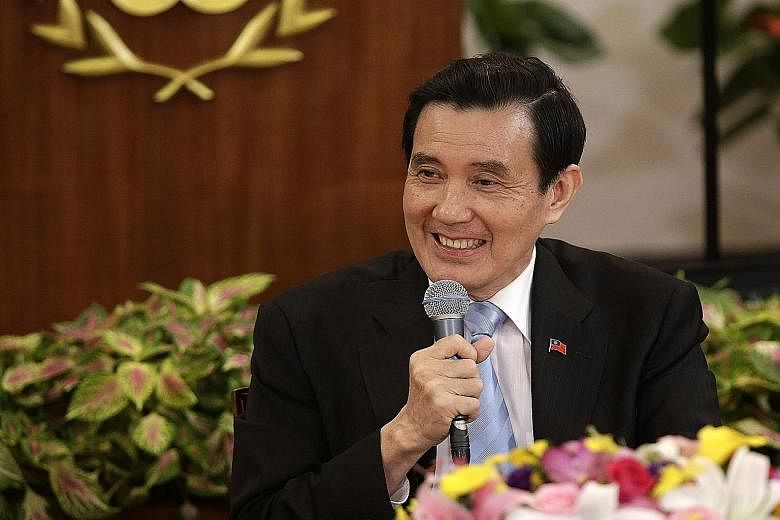Taiwanese President Ma Ying-jeou defended his landmark summit with Chinese President Xi Jinping in Singapore tomorrow, saying it is for the good of the next generation of Taiwanese amid speculation that he was trying to boost his Kuomin- tang's flailing election campaign.
"The summit is not for the next election, it is for the welfare of the next generation. I feel it is my duty to build a bridge for the two sides, so whoever is the next president can use it to cross the river," Mr Ma told a press conference yesterday.
"We will explain the actual situation to Mr Xi, particularly tell them about Taiwan's status so they can better understand and take it in full consideration when they formulate Taiwan, cross-strait policies."
However, with Kuomintang (KMT) chairman and presidential candidate Eric Chu badly trailing opposition Democratic Progressive Party candidate Tsai Ing-wen at 16.4 per cent to Ms Tsai's 47.1 per cent, pundits have said the meeting is also aimed at influencing the polls.
The KMT's move last month to switch presidential candidates from the deeply pro-unification Ms Hung Hsiu-chu to Mr Chu, which was meant to improve the party's chances in both the presidential and legislative elections on Jan 16, had alienated its deep-blue supporters. Some moderate KMT supporters also deserted the party in disappointment at the hasty way in which the party bundled off Ms Hung with little due process beyond a vote taken at an emergency party congress, analysts have said.
Ms Hung was ditched because her pro-unification platform of signing a peace treaty with China and reaching a consensus on "one China" had been unpopular with Taiwanese voters, many of whom are unhappy with Mr Ma's China-friendly policy which they believe has benefited big business but not ordinary Taiwanese. Her candidacy had also begun to poison the campaigns of KMT legislative candidates.
Since the announcement of the summit, some alienated deep-blue supporters of the KMT have begun to return to the fold, said Mr Sun Yang-ming, senior adviser to think- tank Prospect Foundation, citing internal surveys of the party.
He explained that these ideologically driven supporters were encouraged by Mr Ma's move to meet Mr Xi, which shows the party's commitment to better cross-strait ties.
Indeed, the summit has found support among the majority of Taiwanese, with the Mainland Affairs Council's own poll showing 80 per cent of Taiwanese supported the summit. Broadcaster TVBS' poll found 50 per cent approved of it while 35 per cent opposed it.
This is putting pressure on Ms Tsai, who heads the pro-independence DPP, to clarify her cross-strait platform, said cross-strait expert George Tsai of the Chinese Culture University.
She has refused to state her stand on the 1992 consensus - that there is one China with the two rivals having different interpretations of what this means - a condition Beijing has laid down for cross-strait exchanges. She would say only that she is committed to peaceful and stable development of cross-strait ties. In the 2012 presidential election, her opposition to closer ties with China cost her votes.
Professor Tsai added that the Ma-Xi summit, which is training the spotlight on the cross-strait issue so close to the elections, is beneficial to the election campaign of the KMT, which is seen by Taiwanese as being more experienced in dealing with mainland China.
Even if it does not help the KMT win - given the wide gap between the two parties in the presidential and legislative polls - it would at least mean the party will lose less badly, so it is strong in opposition.
"It will certainly boost the morale of the party and its election prospects," Prof Tsai said.
The DPP strongly opposes the summit, with Ms Tsai quoted by media as saying: "The people will not allow Ma to limit Taiwan's future purely for his own political credit."


